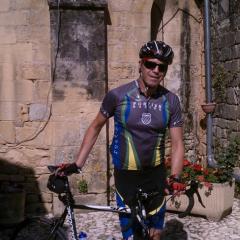
Yom Yerushalayim
Yom Yerushalyim is celebrated on the 28th day of the month of Iyaar (this year on May 12th) celebrating the reunification of Jerusalem and the establishment of Israeli control over the Old City at the end of the Six-Day War. From 1948 (the War of Independence) until this time, Jerusalem had been a city divided. Jerusalem is both an ancient and modern city and this mixture of new and old, modern and ancient, is best portrayed through the music and lyrics that pay tribute to this most sacred of citites.
I am very fortunate to have both a physical and a spiritual home in Jerusalem. The spiritual home resides within my heart and soul. My connection to a city, which is really just a sprawl of stones, buildings, alleys and troubled borders, defies reason and rationale. But as I walk the streets of Jerusalem I feel within my heart the songs of the ages -- the prayers of the kings and prophets, the cries, dreams, and hopes of an ancient and now a modern people. As I walk through Jerusalem, I can feel the pulse of history through the soles of my shoes and the sweep of history as the summer wind comes off the desert.
The ancient Jerusalem I love is the Jerusalem portrayed in the Book of Psalms-specifically Psalms 120-134. Our tradition tells us the Levites sang these texts in ancient Jerusalem on the fifteen steps from the Temple’s Court of the Women to the Court of the Israelites. Other sources contend that these verses were chanted as pilgrims made their way to Jerusalem and ultimately to the Temple. The text of Psalm 121 is especially evocative considered in either of these historical contexts: worshippers asking from where will their help come and knowing that their spiritual guidance will come from the Almighty and that God will not let their feet slip or tarry as they make their journey. One contemporary setting by the Israeli group, “Shevah” successfully melds the sense of the physical procession and emotional anticipation as the sacred of Jerusalem approaches.
The selection begins slowly and builds to an ecstatic psalm of praise.
Psalm 126, another Song of Ascents, celebrates the return to Zion as the psalmist proclaims, “Our mouths were filled with laughter, our tongues with songs of joy.” It is a song of celebration upon return to Jerusalem. This psalm has many settings, but a personal favorite is that composed by Yossele Rosenblatt. Here, in a contemporary rendition of Rosenblatt’s setting, the Israeli singer Bat-Ella transforms the famous melody into one that sounds typically Israeli with the beat of middle percussion, guitar and accordion:
In modern Jerusalem, my home is in the section of the city known as Abu-Tur. Adjacent to Derech Hebron (Hebron Street), it is a small enclave of winding walkways, terraced buildings and small gardens. It is also one of the few neighborhoods in all of Jerusalem that is comprised of Jewish Israelis and Arab Israelis. From the mirpesest (balcony) of the apartment, when the air is clear and the desert haze momentarily lifts, I can see the Judean Desert. Yom Yerushalyim is very real for me in Jerusalem, as my apartment building literally sits on what was called the Green Line. This armistice line established after the 1948 War of Independence essentially separated Israel from its nearby Arab countries and split Jerusalem in half, with the Old City and its historical and religious sites out of Israeli control.
Yom Yerushalyim realizes the dream of being able to walk the cobbled streets of this most sacred city. The most emotional symbol of Jerusalem’s reunification is the Western Wall. In “HaKotel” the words and music song pay tribute to those soldiers who died fighting in 1967 to regain Jerusalem.
Jerusalem is a city that I love in both its modern and ancient manifestations and on Yom Yerushalyim we are privileged to celebrate the historic alongside the contemporary. Jerusalem may be a reunified city but it is still a city of contrasts and conflicts. It is home to many ethnicities, religions and political viewpoints. But often as I walk the streets of Jerusalem, I am able to forget about the divergence and disagreement that often envelops Jerusalem and instead I am overwhelmed by its beauty.
If I walk around the corner from my home, the Old City comes into view. In the summer light, the domes and spires of ancient Jerusalem shimmer as they reflect the sun. Modern Jerusalem is as Naomi Shemer writes: Yerushalyim shel zahav: a Jerusalem of Gold. In this setting of Shemer’s famous song, Ofra Haza, a singer of Yemenite heritage, adds her distinctive sound to this anthem to Jerusalem -- a city we pray will someday become a “City of Peace” for all peoples.

